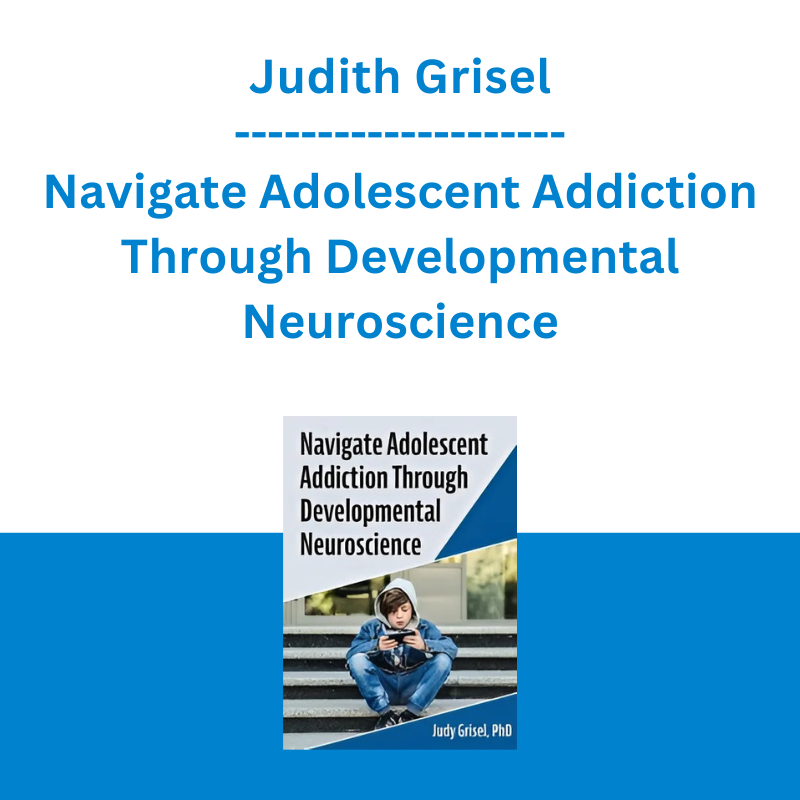*** Proof of Product ***
Exploring the Essential Features of “Judith Grisel – Navigate Adolescent Addiction Through Developmental Neuroscience”
Speaker: Judith E Grisel, PhD
Duration: 1 Hour 32 Minutes
Format: Audio and Video
Copyright: Oct 28, 2023
Media Type: Digital Seminar
Description
Substance use disorders are a leading cause of death and disability. While multifarious, the strongest predictor of addiction is drug use during adolescence, when individuals are neurobiologically primed for risk, experimentation, and salience.
This session will demonstrate how critical periods of brain development intersect with innate predispositions, opportunity, and childhood trauma to catalyze substance use disorders, and how translating developmental neuroscientific research for patient care can help reduce the risk for addiction and promote individual flourishing.
Speaker
Judith Grisel, PhD, is a professor of Psychology and Neuroscience at Bucknell University. Her efforts in the classroom, laboratory, and public domain have positively impacted students, the field of behavioral neuroscience, and the broader community. As an active scholar, Judy has been recognized as an outstanding mentor by the Howard Hughes Medical Institute. With students and the support of the National Institutes of Health, she’s published dozens of scientific articles, primarily on the complex causes of drug abuse. Current studies focus on sex-dependent influences of stress on drug reinforcement, and the role of endogenous opioids in alcohol use disorders. A strong proponent of the liberal arts, she teaches a wide range of undergraduate courses, including introductory psychology and neuroscience, and a popular seminar in neuroethics. In 2019, Judy published a book on the neuroscience and experience of addiction that became a NY Times bestseller, which has since been translated for a worldwide audience. She regularly speaks on the relationship between the brain and behavior to parents, teachers, legislators, the judiciary, and clinicians; she’s shared her knowledge effectively from classrooms to the World Economic Forum in Davos. As a recovering addict, scientist, and practiced instructor, Judy is uniquely qualified to communicate knowledge about the neural causes and consequences of substance use disorders.
Speaker Disclosures:
Financial: Judith Grisel has employment relationships with Furman University and Bucknell University. She receives royalties as a published author. Judith Grisel receives a speaking honorarium and recording royalties from PESI, Inc. She has no relevant financial relationships with ineligible organizations.
Non-financial: Judith Grisel is a member of the International Behavioral and Neural Genetics Society, the American Association for the Advancement of Science, the Association for Women in Science, the International Society for Brain Research on Alcoholism, and the International Neuroethics Society. She is an ad hoc reviewer for several publications, for a complete list contact PESI, Inc.
Objectives
- Demonstrate how genetic vulnerabilities, socio-cultural influences, and developmental changes intersect with critical periods of brain development to give rise to substance use disorders.
- Assess how addictive drugs exploit neural circuits that ascribe meaning, thereby undermining healthy development and enhancing the risk for addiction.
- Describe how neural plasticity during adolescence serves individual developmental goals and benefits society as a whole.
- Apply findings in developmental neuroscience to help clients take advantage of the enhanced opportunities for flourishing that are encoded in the adolescent brain.
- Demonstrate comprehension of the complex interplay between genetic vulnerabilities, socio-cultural influences, and developmental changes, elucidating how they converge with crucial phases of brain development to contribute to the emergence of substance use disorders.
- Employ evaluative skills to analyze the manipulation of neural circuits by addictive substances, thereby impairing the formation of constructive neural connections that facilitate healthy development, ultimately elevating the susceptibility to addiction.
- Objective: Present a detailed account of the role of neural plasticity in adolescence, highlighting its contributions to individual developmental milestones and its broader positive impact on societal progress.
- Objective: Translate insights derived from developmental neuroscience research into actionable strategies for guiding clients, enabling them to capitalize on the heightened potential for growth embedded within the adolescent brain, and fostering an environment conducive to optimal flourishing.
Outline
Overview of Adolescent Neural Plasticity
- Dual impact of the final surge of neural plasticity during adolescence
- Neural plasticity’s role in promoting healthy development and triggering substance use
Recognize Risk Factors
- Risk factors associated with drug use disorders in clients
- Neuroscience-informed strategies to minimize susceptibility
Balance Vulnerability and Resilience
- Delicate balance between heightened vulnerability during developmental phases and the concurrent potential for remarkable resilience, supported by empirical research
Harnessing Developmental Interventions
- Developmentally-informed interventions and their disproportionate influence on shaping adult trajectories, drawing from the current scientific landscape
Target Audience
- Psychologists
- Licensed Clinical/Mental Health Counselors
- Addiction Professionals
- Social Workers
- Marriage & Family Therapists
- Case Managers
- School Administrators
- Schoo-Based Mental Health Professionals
Please see the full list of alternative group-buy courses available here: https://lunacourse.com/shop/










 Julie Stoian & Cathy Olson - Launch Gorgeous - Funnel Gorgeous Bundle
Julie Stoian & Cathy Olson - Launch Gorgeous - Funnel Gorgeous Bundle  Matthew Kratter - Trader University
Matthew Kratter - Trader University  Toshko Raychev - Profit System + ITF Assistant
Toshko Raychev - Profit System + ITF Assistant  Simpler Trading - Bruce Marshall - The Options Defense Course
Simpler Trading - Bruce Marshall - The Options Defense Course